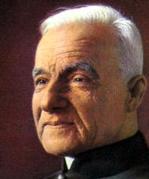Make your gift today!
Help keep Catholics around the world educated and informed.
Already donated? Log in to stop seeing these donation pop-ups.
Catechism of the Catholic Church
65 "In many and various ways God spoke of old to our fathers by the prophets, but in these last days he has spoken to us by a Son." 26 Christ, the Son of God made man, is the Father's one, perfect and unsurpassable Word. In him he has said everything; there will be no other word than this one. St. John of the Cross, among others, commented strikingly on Hebrews 1:1-2:
In giving us his Son, his only Word (for he possesses no other), he spoke everything to us at once in this sole Word - and he has no more to say. . . because what he spoke before to the prophets in parts, he has now spoken all at once by giving us the All Who is His Son. Any person questioning God or desiring some vision or revelation would be guilty not only of foolish behaviour but also of offending him, by not fixing his eyes entirely upon Christ and by living with the desire for some other novelty. 27
66 "The Christian economy, therefore, since it is the new and definitive Covenant, will never pass away; and no new public revelation is to be expected before the glorious manifestation of our Lord Jesus Christ." 28 Yet even if Revelation is already complete, it has not been made completely explicit; it remains for Christian faith gradually to grasp its full significance over the course of the centuries.
67 Throughout the ages, there have been so-called "private" revelations, some of which have been recognized by the authority of the Church. They do not belong, however, to the deposit of faith. It is not their role to improve or complete Christ's definitive Revelation, but to help live more fully by it in a certain period of history. Guided by the Magisterium of the Church, the sensus fidelium knows how to discern and welcome in these revelations whatever constitutes an authentic call of Christ or his saints to the Church.
Christian faith cannot accept "revelations" that claim to surpass or correct the Revelation of which Christ is the fulfilment, as is the case in certain nonChristian religions and also in certain recent sects which base themselves on such "revelations".
IN BRIEF:
68 By love, God has revealed himself and given himself to man. He has thus provided the definitive, superabundant answer to the questions that man asks himself about the meaning and purpose of his life.
69 God has revealed himself to man by gradually communicating his own mystery in deeds and in words.
70 Beyond the witness to himself that God gives in created things, he manifested himself to our first parents, spoke to them and, after the fall, promised them salvation (cf. Gen 3:15) and offered them his covenant.
71 God made an everlasting covenant with Noah and with all living beings (cf. Gen 9:16). It will remain in force as long as the world lasts.
72 God chose Abraham and made a covenant with him and his descendants. By the covenant God formed his people and revealed his law to them through Moses. Through the prophets, he prepared them to accept the salvation destined for all humanity.
73 God has revealed himself fully by sending his own Son, in whom he has established his covenant for ever. The Son is his Father's definitive Word; so there will be no further Revelation after him.
Notes:
English Translation of the Cathechism of the Catholic Church for the United States of America © 1997, United States Catholic Conference, Inc.






